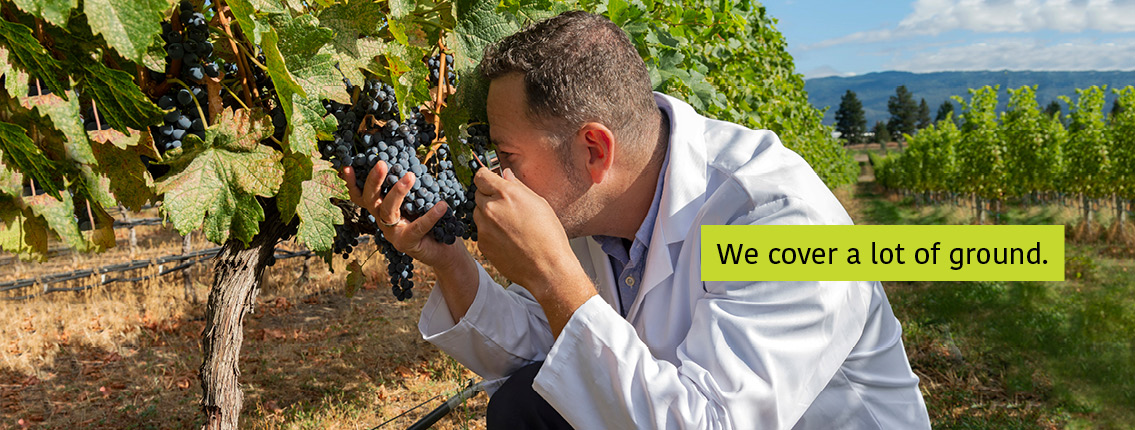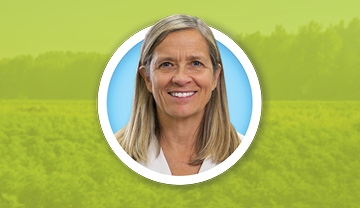
Dr. José Ramón Úrbez-Torres
Research Scientist - Plant Pathology
Summerland Research and Development Centre
Why did you become a scientist?
I think it began one summer working as an undergraduate student in a research facility; I had a fascinating job working in the vineyards monitoring moth populations that were damaging wine grapes. I thought it was so intriguing that, based on my work, other scientists could build moth population models that would tell the grape growers exactly when to control them using crop management tools. Now, many years later, I still have that strong sense of curiosity and amazement about our research findings; I guess that's why I became a scientist.
Meet Dr. José Ramón Úrbez-Torres
Video transcript
[Upbeat, cheerful music begins.]
[Dr. Jose Ramon Urbez-Torres walks down a hallway in Summerland research centre.]
[A green geotag icon appears on the bottom of the screen with text.]
Text on screen: Summerland, British Columbia
Voice of Dr. Jose Ramon Urbez-Torres : When people ask me about my work and what I do, and I tell them I'm a plant pathologist; I'm a plant doctor.
[Cut to clip of Jose entering a greenhouse room and examining a plant.]
Jose: The first question they have is, really, plants get sick? Same as doctors help in a hospital, we help growers here through research.
[Cut to Jose in a lab being interviewed.]
[A green and white banner crosses the bottom left corner of the screen with text on it.]
Text on screen: Dr. Jose Ramon Urbez-Torres. Plant pathologist. Agriculture and Agri-Food Canada.
Jose: My name is José. I'm a research scientist at the Summerland Research and Development Centre in British Columbia.
[Cut to Jose closely examining a leaf in the green house.]
Jose: We humans we can feel bad, we can go to the doctor and we can tell the doctor what's going on with us; the symptoms.
[Cut to zoomed in clip of Jose observing plants.]
Jose: Plants, of course, cannot do that, so the owners they will give us a call and they will explain to us some symptoms, you know, they are not used to.
[Cut back to Jose in the lab.]
[Cut to clip of Jose walking through a research vineyard.]
[Cut to close up of Jose examining grapes with leaves are discoloured.]
Jose: So, we many times go to the vineyards, to the orchards, and assess those plants; look for symptoms and signs that will identify as diseases.
[Cut to clip of Jose checking on his team in the lab as they do research.]
Jose: Our first step, we have to really identify the pathogen. Is this a fungal pathogen, if it's a virus; if it's a bacteria. Once we have that identified, we try to understand how this pathogen works under our environmental conditions.
[Cut to close up of scientists hand holding a test tube.]
[Cut to panoramic clip of the vineyard.]
Jose: We put all this together to try to find the best control strategies against this disease. Our research helps growers to keep their products, their orchards, their grapes healthy.
[Cut back too Jose in the lab.]
Jose: That means they can produce a high-quality product, high quality fruit, high quality wine that every Canadian can enjoy at the table.
[Cut to an ending text screen on a white background.]
Text on screen: Learn more at, agr.gc.ca/fields-of-science. We cover a lot of ground.
[Screen fades into the Canada wordmark. Upbeat, cheerful music fades out.]
Profile
What do you like the most about your job?
Among the many things I like about my job, I like the people I work with. We have a great team of scientists, technicians and students all doing fantastic research. I also like to see that grape and tree fruit growers personally use and adapt many of the solutions we provide through our research.
What is the coolest fact about your field of science?
I am a plant pathologist; in simple terms, I am a plant doctor. It is very cool that I am able to use research as well as tools we develop to diagnose disease, identify germs in crops and find a solution to help the grower. Similar to a human doctor, I figure out what germs cause the disease and then provide a prescription.
What was the biggest challenge you have ever encountered in your career?
Being 10,000 kilometres away from all my family.
What is the most common question people ask you about your work?
"Plants get sick? Really?"
What is the funniest thing that has happened to you at work?
One year, a bear ate our apple field research trial. It's something common here in Summerland. In the summer, bears often come and walk by the different research fields, sometimes eating the fruit we are currently studying. It's just what happens when you have all this wildlife around the research station.
One morning, we found apples eaten and a few trees damaged by the bears— and we knew it was bears because they 'marked their territory' everywhere. Luckily, we always have extra trees in some of our most exposed plots, so our research was not affected.
Passion may be the ultimate weapon in helping Canadian wines succeed
Every Canadian grape that becomes wine must first survive a range of diseases.
One of those enemies is leafroll disease. Considered one of the most destructive diseases for grapevine health around the world, it's caused by several viruses that combine to delay fruit ripening and lower fruit quality.
Dr. José Ramón Úrbez-Torres, a plant pathologist at Agriculture and Agri-Food Canada (AAFC), explains, "once it attacks, it can cut grape yields by as much as 40 per cent. It can be devastating to farmers, local wine makers and winery-based tourism because no healthy grapes means no high quality wine."
Another enemy is red blotch disease. Research conducted in collaboration with Dr. Pat Bowen, Carl Bogdanoff and Dr. Kevin Usher at AAFC's Summerland Research and Development Centre in British Columbia showed infected grapes ripen later, have altered colour and are smaller, which lowers the quality and value of wine made from those grapes.
Dr. Úrbez-Torres notes that "the traditional method of using chemical pesticides to control grapevine diseases is being replaced with more environmental friendly methods. Both consumers and farmers are looking for alternative methods to win this battle. It's a pressure cooker to find solutions."
To control diseases for example, Dr. Úrbez-Torres and his colleagues, have been working with local farmers for the past five years. They've been teaching growers about the diseases, the germs involved and in some cases the insects that spread them. The goal is to use all available information to develop and implement regional strategies to control the spread of viruses.
"This knowledge didn't come out of thin air", says Dr. Úrbez-Torres. "It was years of mapping and monitoring the natural spread of the viruses. Also, with the collaboration of AAFC Entomologist Dr. Tom Lowery, figuring out which insects were carrying the disease to plants, studying the biology of the disease, and testing ways to control it naturally."
"My colleagues and I are passionate about what we do. Canada has an award-winning wine industry that bottles over 250 million bottles a year. We can't let farmers, vintners, and Canadians down. This is a battle we will continue to fight so that people can lift a glass of Canadian wine and say this is the best wine they ever tasted."


